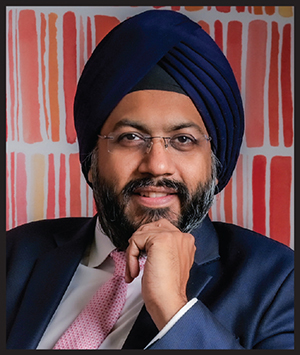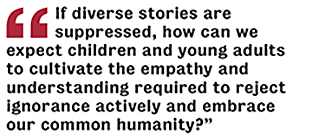Sharpening My Resolve | Censorship
Growing up in India as a young Sikh boy to aspiring middle-class parents, I understood their singular focus was to educate their children. Books were the windows that allowed me to gaze into a world far beyond my limited surroundings or imagination. The ancient tales of equality, courage, and righteousness from our scriptures, region, and history of valor ignited my imagination as I got older. At the same time, contemporary literature exposed me to the rich tapestry of cultures that coexisted in our vibrant nation.

 Growing up in India as a young Sikh boy to aspiring middle-class parents, I understood their singular focus was to educate their children. Books were the windows that allowed me to gaze into a world far beyond my limited surroundings or imagination. The ancient tales of equality, courage, and righteousness from our scriptures, region, and history of valor ignited my imagination as I got older. At the same time, contemporary literature exposed me to the rich tapestry of cultures that coexisted in our vibrant nation. Even at a tender age, the printed word imbued me with empathy, understanding, and an unquenchable thirst for knowledge. I read poetry in English, Hindi, Punjabi, and Urdu; folk tales from the history of India; science; and religious texts. Varied and sometimes controversial (depending on one’s perspective) texts from Dickinson, Frost, Angelou, Neruda, Poe, Pushkin, Blok, Pritam, Khusrow, and even Dr. Seuss influenced my life and perspective deeply.
Growing up in India as a young Sikh boy to aspiring middle-class parents, I understood their singular focus was to educate their children. Books were the windows that allowed me to gaze into a world far beyond my limited surroundings or imagination. The ancient tales of equality, courage, and righteousness from our scriptures, region, and history of valor ignited my imagination as I got older. At the same time, contemporary literature exposed me to the rich tapestry of cultures that coexisted in our vibrant nation. Even at a tender age, the printed word imbued me with empathy, understanding, and an unquenchable thirst for knowledge. I read poetry in English, Hindi, Punjabi, and Urdu; folk tales from the history of India; science; and religious texts. Varied and sometimes controversial (depending on one’s perspective) texts from Dickinson, Frost, Angelou, Neruda, Poe, Pushkin, Blok, Pritam, Khusrow, and even Dr. Seuss influenced my life and perspective deeply.
My childhood experiences with literature and poetry left a lasting impact and guided me to author the “Jeet and Fudge” series. In this early reader series, a young adopted Sikh boy and his furry companion embark on adventures of community service and volunteerism. Crafting these stories, I hoped to inspire the next generation with empathy, acceptance, and giving back—virtues that helped me persevere through my own experiences of being an “other.”
Too often, my turban—a proud symbol of my Sikh faith—prompted suspicion and unconscious prejudices. As much as snide remarks, microaggressions, and subtle biases marred personal and professional interactions, there have been countless positive, curious, and encouraging reactions as well. Each instance of intolerance I endured became a stone upon which I sharpened my resolve—to enlighten through achievement, representation, and the power of storytelling.
Now, as a CEO, 20 years stateside and a key vendor in the library market, I am profoundly disheartened by the resurgent efforts to challenge and ban books across many communities. I am a firm believer that one should act upon personal choice when deciding which books to purchase or bring home from a library. Libraries—as community institutions that are open to all and that recognize the diversity of perspectives in that community—are sanctuaries of intellectual freedom, where access to diverse narratives, ideas, and perspectives should remain unimpeded.
 To see titles face opposition and censorship at libraries strikes at the very core of my experience. If I had been denied access to the books that helped me grow, would I have been able to persevere through the bigotry I’ve faced? Would I have been able to move 7,900 miles away from family and home to create a career that is grounded in advancing literacy and supports the broader economy? If diverse stories are suppressed, how can we expect children and young adults to cultivate the empathy and understanding required to reject ignorance actively and embrace our common humanity?
To see titles face opposition and censorship at libraries strikes at the very core of my experience. If I had been denied access to the books that helped me grow, would I have been able to persevere through the bigotry I’ve faced? Would I have been able to move 7,900 miles away from family and home to create a career that is grounded in advancing literacy and supports the broader economy? If diverse stories are suppressed, how can we expect children and young adults to cultivate the empathy and understanding required to reject ignorance actively and embrace our common humanity?
As members of the library community, we must advocate for access and the free exchange of ideas. And we must protect librarians, who continue to face unprecedented pressure for simply following the ethos of their profession that breathes life into the notion of democracy and freedom itself.
In my journey, the viewpoints I’ve gained through reading have shaped my identity as deeply as my ancestral faith. They have emboldened me to see beyond what is familiar and reject the fear of what is unknown.
To hinder access to that freedom of the mind is among the gravest injustices we could commit against the future. It is through the real stories and imagination captured in books that we cultivate the empathy, wisdom, and understanding to build a more conscious, caring world.
Amandeep Kochar Is President and CEO of Baker & Taylor.
 MORE FROM LJ ON THE IMPACTS OF CENSORSHIP
MORE FROM LJ ON THE IMPACTS OF CENSORSHIP
United We Stand: A Conversation with Hanif Abdurraqib & Jacqueline Woodson
 It Gets Personal: Four Voices
It Gets Personal: Four Voices
BROOKY PARKS l Hard Victory for Equity
SKIP DYE l The Making of an Advocate
DR. CARLA HAYDEN l Renewing Our Commitment
AMANDEEP KOCHAR l Sharpening My Resolve
 On the Books: Library Legislation 2024
On the Books: Library Legislation 2024
RELATED
ALREADY A SUBSCRIBER? LOG IN
We are currently offering this content for free. Sign up now to activate your personal profile, where you can save articles for future viewing









Add Comment :-
Comment Policy:
Comment should not be empty !!!